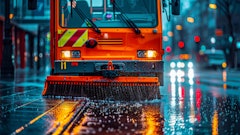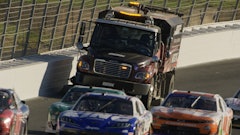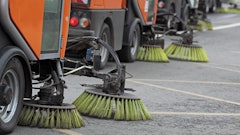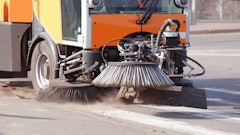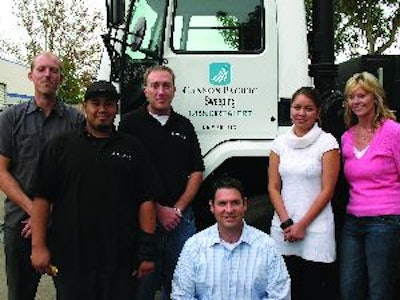
Working after the fires
The 2007 wildfires in Southern California have both negative and positive effects on contractors? businesses in the area.
Contractors in the pavement maintenance industry of Southern California are getting back in the swing of things following the fires of last October. Many had work put on hold because of the unhealthy air conditions and evacuations. Although most businesses only had to close down for a few days, pavement maintenance contractors saw and will see effects on both current and future business.
In November, Cannon Pacific Services, San Marcos, CA, was in a route make-up mode, according to President Lee Miller. Cannon Pacific specializes in municipal street sweeping, power washing, and other property maintenance services for a diverse government, commercial, and private customer base in San Diego, Orange, Imperial, and Riverside counties.
The company was shut down for three days during the fires due to the amount of smoke in the air. "Our equipment, like most, struggles in extremely poor air quality conditions like we had during the fires, so the equipment wasn't functioning at optimum levels. Plus, it was unsafe for our employees to be out in those poor air quality conditions."
Miller says they had to cancel jobs including sweeping city streets, parking lots, and commercial centers. But it didn't take long for business to pick up. "There was a ripple effect that came in the following week, and we're even feeling it even today that we're in a make-up mode," he says. "And what we're finding is an unusual amount of ash and heavy debris in the curb line because the extremely high Santa Ana winds."
Even after the fires were put out, ash was still settling into the surrounding areas and onto the pavement. This made the job of cleaning the pavement even more difficult. "One sweep is not enough. We're returning two and three times to get all the ash because it's still airborne; it's still settling."
Although Cannon Pacific has seen an increase of business in the aftermath of the fires, Miller says eventually business will level off and return to normal. "I think in terms of long-term impact on the construction side it is going spike and then level off." Miller says he sees a similar increase and leveling off for the parking lot side of his business also. The biggest challenge he is facing is in scheduling the additional work during the spike.
The wildfires had similar effects on Apache Asphalt and Seal Corp., Vista, CA. Apache Asphalt offers paving, sealcoating, striping, overlays, removal and replacement work, and crackfilling services in San Diego County. During the fires, the company also had to close down, according to President Stewart McClure.
"We had two large sealcoating jobs that we were doing -about 300,000 sq. ft. of sealcoating," McClure says. "The smoke was so thick with the ash falling down that we had to cancel that work and try to reschedule it in the next couple of weeks. They also had to evacuate the area we were working in."
He says an office manager came in a couple hours each day to check the phones, but no work could be done. That week's loss of income had a definite financial effect on the business, he says.
Now Apache Asphalt is scrambling to reschedule work that had to be canceled. Some rescheduling is causing other previously scheduled jobs to be postponed. "We've had to speak to other customers, and there seems to be a good understanding under these sorts of conditions. People have understood the problems that we have been faced with as far as doing the rescheduling."
Despite the fact that the wildfires were a disaster, McClure says there is a flip side to the event. "Whenever there is a fire like that there's damage to the asphalt. The asphalt gets burnt and has to be dug up, repaired, and redone. So there's opportunity coming, but that might take a while," he says. "We have to look at it in a positive light, although you feel for the people that lost their homes." However, McClure says he doesn't think a positive economic impact from the fires will happen for at least six months, due to the permitting process.
Because so much pavement was burnt, McClure sees additional work opportunities in this area. According to McClure there are degrees of burnt pavement that determine whether the asphalt needs an overlay or needs to be completely removed and redone. Those degrees depend on how long the flame was on the asphalt.
Fire blackens asphalt and makes it more brittle because it is burning up the oil in the asphalt. This effect on pavement is known as spalling, McClure says. "If it's spalled away we may be able to take it and scrape it down to a solid portion of the pavement, asphalt tack it with an asphalt tar, and then skin patch it or put an overlay on it."
However, if fire has burned the pavement for an extended period of time it can burn a hole into the pavement and cause damage most or all the way through. In this case, the pavement would need to be completely removed and repaired, McClure says. "If you overlay it, it could very well just kind of be crumbling underneath and you don't really have a good support for your overlay," he adds.



![Pavement Awards 2025[main]](https://img.forconstructionpros.com/files/base/acbm/fcp/image/2024/05/PavementAwards_2025_main_.665883e4276e8.png?auto=format%2Ccompress&bg=fff&fill-color=fff&fit=fill&h=100&q=70&w=100)
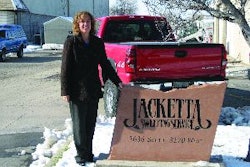
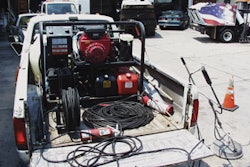
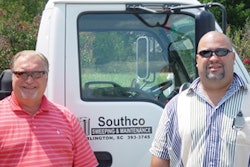





![Pavement Awards 2025[main]](https://img.forconstructionpros.com/files/base/acbm/fcp/image/2024/05/PavementAwards_2025_main_.665883e4276e8.png?ar=16%3A9&auto=format%2Ccompress&bg=fff&fill-color=fff&fit=fill&h=135&q=70&w=240)


